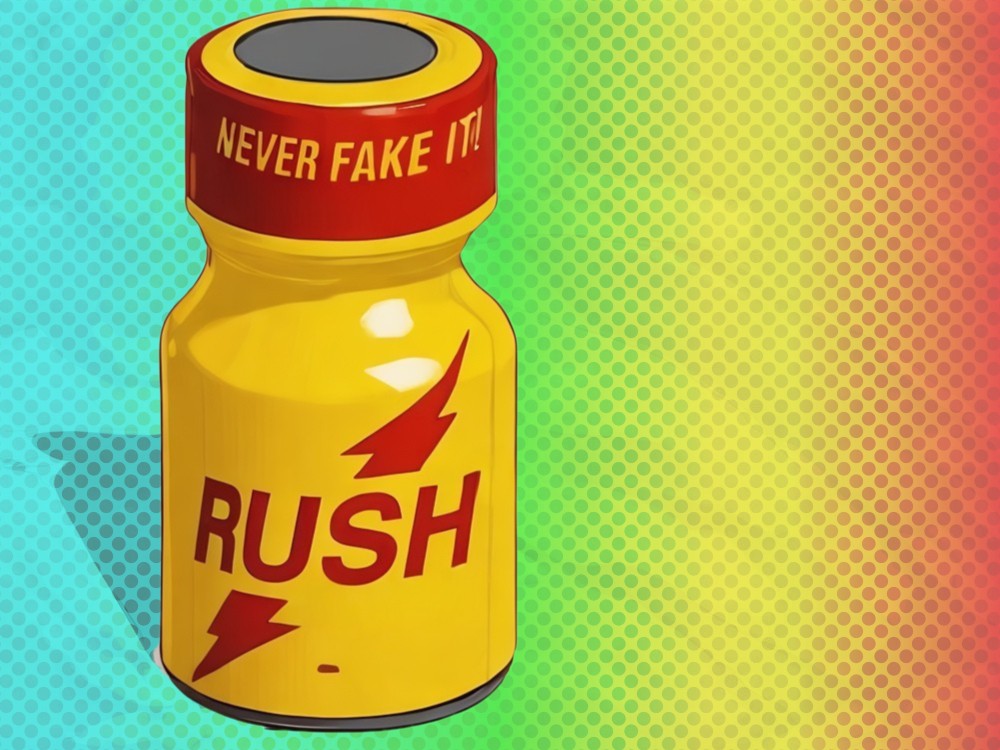Craig Young shares a personal perspective on poppers and outlines legal challenges to the laws around their sale and use in NZ and abroad.
Alkyl and amyl nitrate inhalants—better known as poppers—were a staple of the gay male community in the 1970s and ’80s. I remember using them sparingly in my younger years back in Christchurch. They enhanced the experience of sex, created feelings of euphoria and warmth, and were part of the cultural toolkit for many of us navigating intimacy and pleasure. Now, decades later, social conservatives in the United States are trying to ban them again, and I can’t help but wonder: why this renewed moral panic?
Poppers work by causing vasodilation—the relaxation of blood vessel walls—which leads to short-term effects like dizziness and a pleasant rush. But they’re not for everyone. If you have heart issues, anaemia, or glaucoma, they can pose real risks. Combined with erectile dysfunction drugs like Viagra or Cialis, poppers can dangerously lower blood pressure and potentially cause fainting or strokes. They shouldn’t be swallowed or allowed to touch the skin either—doing so could lead to burns, unconsciousness, or worse.
Some forms of poppers carry specific risks. Isopropyl nitrate has been linked to retinal damage with long-term use, and isobutyl nitrate—banned in the US since 1990 and in the EU since 2017—has shown potential carcinogenic effects in animal studies. Still, one claim that has been soundly debunked is the idea that popper use causes Kaposi’s sarcoma among people living with HIV. That particular myth, perpetuated by AIDS denialists, simply doesn’t hold up to scientific scrutiny.
Despite all this, it’s clear that poppers can be used safely by many when done responsibly. I believe harm reduction, not prohibition, should guide policy. When Australia’s Therapeutic Goods Administration (TGA) attempted to ban poppers in 2018, strong advocacy from health organisations like AFAO and the Kirby Institute led to that proposal being abandoned in 2019.
Meanwhile, in places like Canada and parts of Europe, tighter restrictions remain. In the UK, the Psychoactive Substances Act 2016 threatened a ban until the Advisory Council on Misuse of Drugs clarified that poppers are not psychoactive substances under the law. There, as long as they’re not advertised for human use, they remain legal.
Across the Pacific, the US banned poppers in 1988 and again in 1990. More recently, the FDA—under the questionable direction of Robert F. Kennedy Jr.—raided the offices of Double Scorpio, a popular popper brand. His push for prohibition appears to be fuelled by discredited conspiracy theories, including the harmful myth that poppers cause HIV/AIDS.
Here in Aotearoa, we’re facing our own challenges. In March 2020, the Ministry of Health made poppers prescription-only, following a recommendation from the Medicines Classification Committee (MCC). While it’s technically legal to get a prescription and fill it at a pharmacy, there’s a major snag: Medsafe hasn’t approved any distributors. This leaves people importing products at personal risk, without guaranteed quality, and with the looming threat of Customs involvement.
The NZ Drug Foundation and groups like Body Positive have rightly criticised this overly cautious approach. In March 2023, YOUR EX reported that the Ministry of Health had no plans to change the current policy, even after the International Journal of Drug Policy called out the MCC for lacking evidence-based decision-making.
Personally, I no longer use poppers due to my Type 2 diabetes and an elevated cardiovascular risk profile. But for others, especially those new to gay sex who may find some acts difficult, poppers can play a crucial role in helping them feel more at ease. As Body Positive has said, they’re not just about fun—they’re about accessibility and comfort during sex.
Yes, poppers come with risks. But so do many legal substances. What matters is whether we treat people like adults—capable of making informed decisions—or whether we allow outdated stigma and misinformation to dictate public health policy.

































